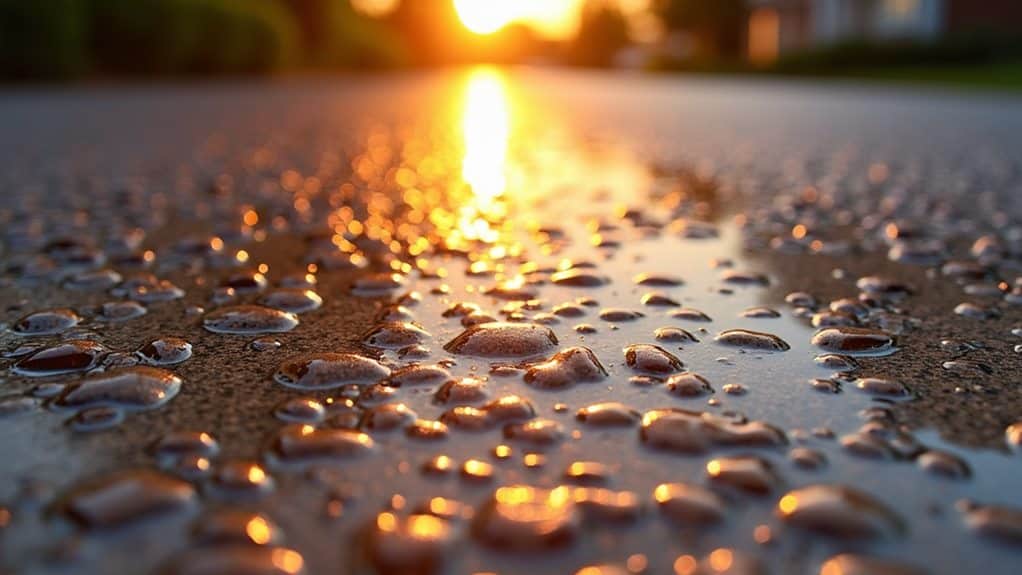Resin driveways typically serve 15-25 years when properly installed and maintained.
Resin-bound systems offer the best durability, lasting up to 25 years, whilst resin-bonded surfaces generally manage 8-15 years. The secret to a long-lasting driveway lies in professional installation, particularly the groundwork and drainage setup.
Think of maintenance like caring for your car – regular sweeping and the odd pressure wash will keep your driveway in top nick.
When laid correctly, these surfaces can handle the weight of several vehicles, withstanding pressures up to 400 tonnes per square centimetre – roughly equivalent to a couple of double-decker buses.
To get your money’s worth, focus on quality installation and routine upkeep.
A well-maintained resin driveway won’t just last longer – it’ll keep your property looking smart for years to come.
Key Takeaways
Resin driveways serve British homes for 15-25 years with proper installation and care, with resin-bound systems outlasting their bonded counterparts.
Getting the foundations right is essential – professional installation with correct base preparation and drainage prevents costly issues down the line.
Basic upkeep like regular sweeping and the occasional pressure wash keeps your resin driveway in top nick, much like maintaining your car.
These surfaces handle Britain’s weather brilliantly. UV-stable resins and permeable surfaces cope well with everything from summer heat to winter frost, preventing those annoying puddles you’d get with traditional paving.
When properly laid, resin driveways easily manage daily family cars, delivery vans and even heavy vehicles – supporting up to 400 tonnes per square centimetre. That’s more than enough for your typical household needs.
Expected Lifespan of Resin Driveways
The lifespan of a resin driveway is a crucial factor when considering this investment. Most resin driveways last 15-25 years with proper installation and upkeep. Regular maintenance, including simple sweeping and occasional jet washing, helps maintain both durability and appearance.
Different resin systems offer varying lifespans. Resin-bound surfaces tend to be more durable, lasting up to 25 years, whilst resin-bonded options typically serve 8-15 years.
Getting the most from your driveway depends on three key factors: quality materials, professional installation and consistent maintenance.
The driveway’s longevity hinges on maintenance and daily demands. Much like a garden patio or wooden deck, regular cleaning and swift repairs will extend its life.
Bear in mind that frequent heavy vehicles and harsh British weather can affect durability. Before installation, consider your specific needs – for instance, if you run a business from home with frequent deliveries, you’ll want the most robust option available.
Proper Installation and Base Preparation
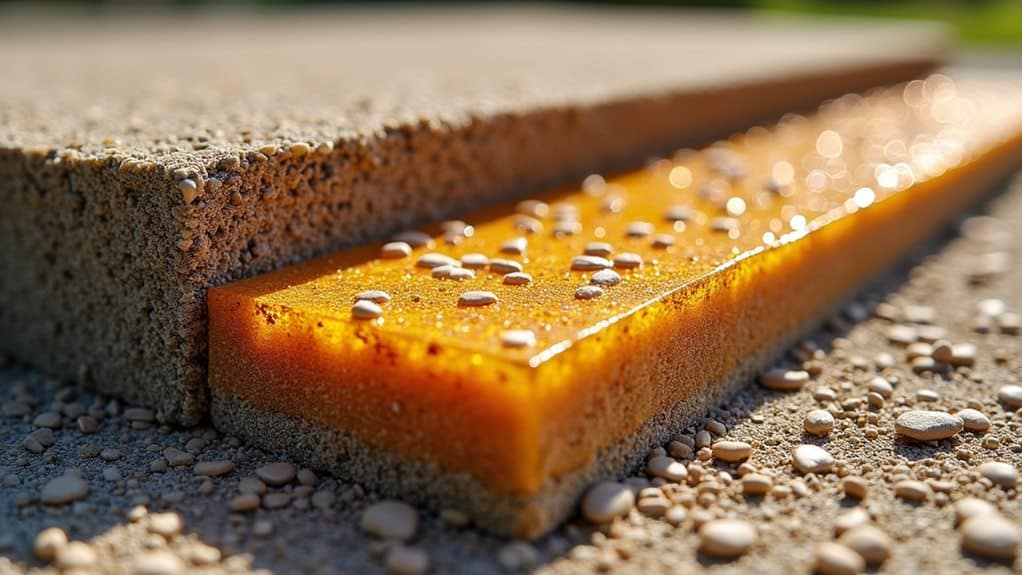
A quality resin driveway relies on expert base preparation and installation. Professional installers must understand how proper fitting affects the surface’s longevity. The key is creating a solid, well-compacted base with proper drainage to prevent water damage.
You’ll need contractors who use forced action mixers (100kg minimum) to ensure materials blend correctly and consistently.
Essential installation steps include:
- Ground testing and removal of weak materials for a stable foundation
- Multi-layer sub-base installation with proper compacting
- Strategic drainage slopes to manage water runoff
- Precise resin-aggregate mixing and even application
- Smooth transitions between sections at consistent depth
Getting the resin-to-aggregate mix exactly right is crucial – any mistakes here can weaken the surface. Your installer should take detailed measurements and prepare the site thoroughly before starting work.
These technical details make the difference between a driveway that lasts and one that fails early.
Weather Impact on Resin Surfaces
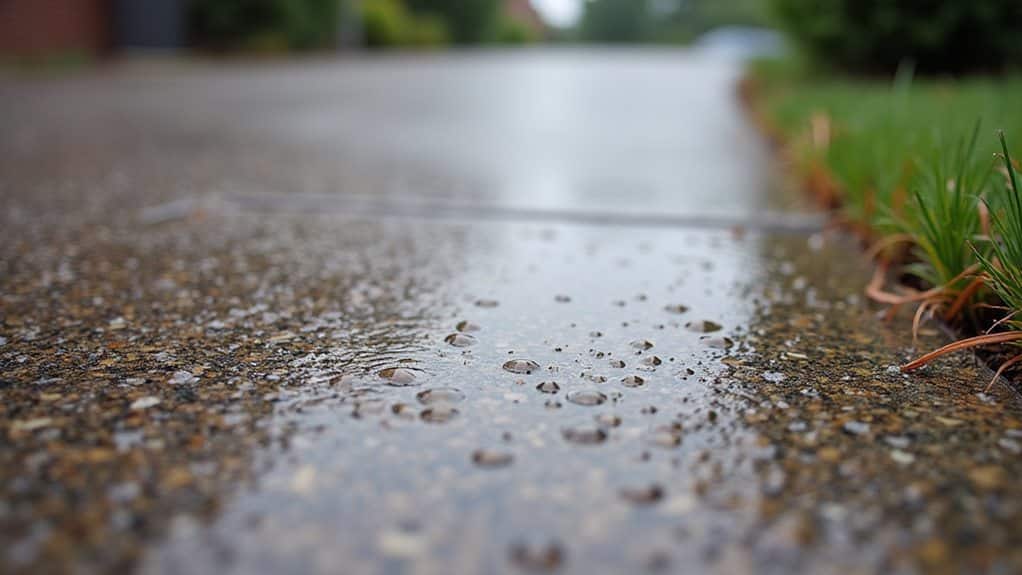
Resin driveways hold up remarkably well against British weather, thanks to their robust design.
The specialist cold-pour method used during installation ensures thorough stone coverage and strong bonding, making the surface highly resistant to our varied climate.
UV-stable resins prevent the surface from fading, even during those rare sunny spells, whilst the material’s natural breathability handles both summer heat and winter frost without cracking.
The surface easily manages our frequent rain, allowing water to drain through rather than pool on top, which proves particularly useful during autumn downpours and winter storms.
Seasonal Temperature Effects
Temperature Effects on Resin Driveways
Modern resin driveways excel at handling Britain’s seasonal temperature changes. These surfaces cope well with our varied weather conditions, from winter frosts to summer heat waves, whilst keeping their structural strength intact.
With correct material calculations and professional installation, they need little upkeep despite challenging weather. The driveway’s special composition allows it to slightly expand and contract with temperature shifts without damage.
UV-resistant resins are crucial for managing temperature extremes, working effectively in both summer heat and winter frost. The permeable nature of resin driveways helps reduce temperature stress by allowing proper drainage, preventing the freeze-thaw damage common in traditional surfaces.
Common seasonal effects include:
- Morning frost patterns in winter
- Rising steam after summer showers
- Distinctive snow-melt drainage patterns
- Reliable grip across different temperatures
- Sun reflection from UV-protected stones
A quality resin driveway’s durability comes from its adaptability to seasonal changes. Well-installed surfaces rarely crack, even during significant temperature swings.
Regular maintenance with appropriate seasonal care ensures the driveway performs reliably year-round.
UV Exposure Protection
UV Exposure Protection
UV protection is vital for resin driveways’ longevity and appearance. When installing a resin driveway, UV exposure impacts both how it looks and how well it holds up over time. The cold-pour method ensures thorough UV protection by completely coating stones with protective resin.
Without proper UV protection, resins can fade badly and break down, spoiling your driveway’s looks and reducing how long it lasts.
For the best results, ensure UV-stable resins are used during installation. These specially designed resins resist fading and keep their colour, even in strong British sunshine. A properly installed UV-stable resin driveway should last about 25 years with proper care.
Good durability isn’t just about the initial installation, though – regular maintenance matters too. Regular cleaning and resealing help maintain UV protection throughout the driveway’s life.
Quality resin driveways work particularly well in sunny garden areas or exposed driveways. By choosing UV-stable resins and keeping up with maintenance, you’re getting a surface that will handle daily use whilst keeping its looks, regardless of sun exposure.
Essential Maintenance and Care Tips

Regular upkeep is vital for maintaining your resin driveway and protecting your investment. A proper care routine involves regular sweeping and occasional pressure washing to clear debris.
Getting a professional check helps spot small issues early on, saving money in the long run. For oil marks and tyre stains, washing-up liquid and careful pressure washing work well.
Watch out for moss and algae, especially in shaded spots – good drainage and regular cleaning are key. In winter, stick to plastic snow shovels and suitable de-icing products to protect the surface.
A well-maintained resin driveway should have:
- Clean surfaces free from leaves and debris
- Original colour without staining
- Clear edges with no moss growth
- Even surface without damage
- Good drainage to prevent puddles
Check regularly for wear, fading and surface damage.
Adjust your cleaning schedule based on weather and how much you use the driveway – busy households might need more frequent attention.
Resin-Bound Versus Resin-Bonded Performance
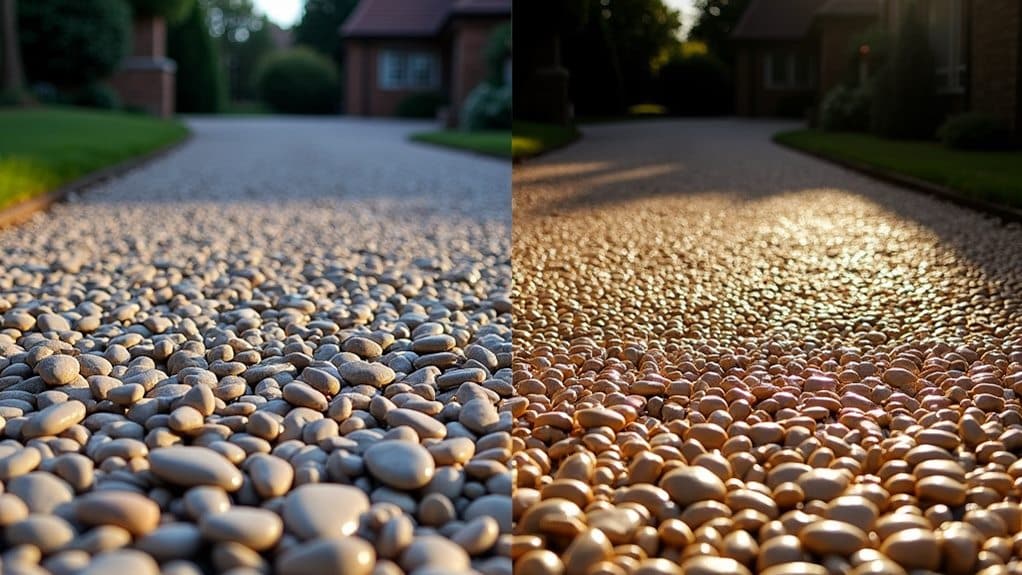
Resin-bound driveways last considerably longer than their bonded counterparts – typically 15-25 years versus 8-15 years. This comes down to how they’re built: resin-bound surfaces mix the stone and resin thoroughly, whilst bonded surfaces simply stick stones to the top layer.
Getting proper installation from qualified specialists is crucial for both types. They’ll ensure correct mixing ratios and proper application, which directly affects how long your driveway will last.
Maintenance-wise, resin-bound surfaces are more hassle-free. The fully-mixed structure keeps stones firmly in place, unlike resin-bonded surfaces where loose stones can scatter about.
Another key advantage of resin-bound driveways is their natural drainage ability, which prevents water damage. Resin-bonded surfaces, however, tend to deteriorate faster due to trapped moisture and uneven wear.
Comparing Wear and Tear
Surface Durability Comparison
Resin-bound driveways last considerably longer than resin-bonded ones – typically 15-25 years versus 8-15 years. This difference stems from how the materials are mixed and laid. Resin-bound surfaces, where aggregates are thoroughly mixed with resin, create a tougher, more durable finish.
When fitted by professionals using UV-stable polyurethane resin, these driveways can last beyond 25 years.
Key durability differences:
- Resin-bound surfaces are smooth and seamless, preventing loose stones and edge damage
- Better drainage in bound surfaces stops frost damage
- Even stone distribution ensures consistent wear
- Built-in UV protection stops fading
- Strong impact resistance prevents dents and marks
Maintenance needs vary significantly between the two types. Resin-bonded driveways often need attention for loose stones, whilst bound surfaces require minimal upkeep.
The water-permeable nature of bound systems helps prevent common issues like puddles and ice damage, making them particularly suited to British weather conditions.
Think of it like comparing a jumper with sewn-in patterns versus one with patterns glued on – the integrated design simply lasts longer.
Maintenance Impact on Longevity
Impact of Maintenance on Surface Life
Resin-bound and resin-bonded surfaces have notably different lifespans based on maintenance. Well-maintained resin-bound surfaces typically last 15-25 years, whilst resin-bonded driveways generally serve 8-15 years. Both systems can handle substantial pressure loads when properly cared for, similar to the weight of a heavily loaded lorry.
Proper maintenance is crucial for longevity. Resin-bound surfaces benefit from regular pressure washing and prompt weed control, which maintain their non-slip properties and appearance. The key lies in correct installation followed by routine cleaning.
Resin-bonded driveways need more frequent attention, as loose stones and uneven patches can develop if neglected.
The quality of maintenance directly affects how long these surfaces last. Following manufacturer guidelines for resin-bound surfaces protects your investment and extends its useful life.
Resin-bonded systems are particularly sensitive to maintenance lapses, with poor upkeep leading to faster deterioration. Think of it like maintaining a car – regular servicing prevents costly problems later.
Traffic Loading and Vehicle Suitability
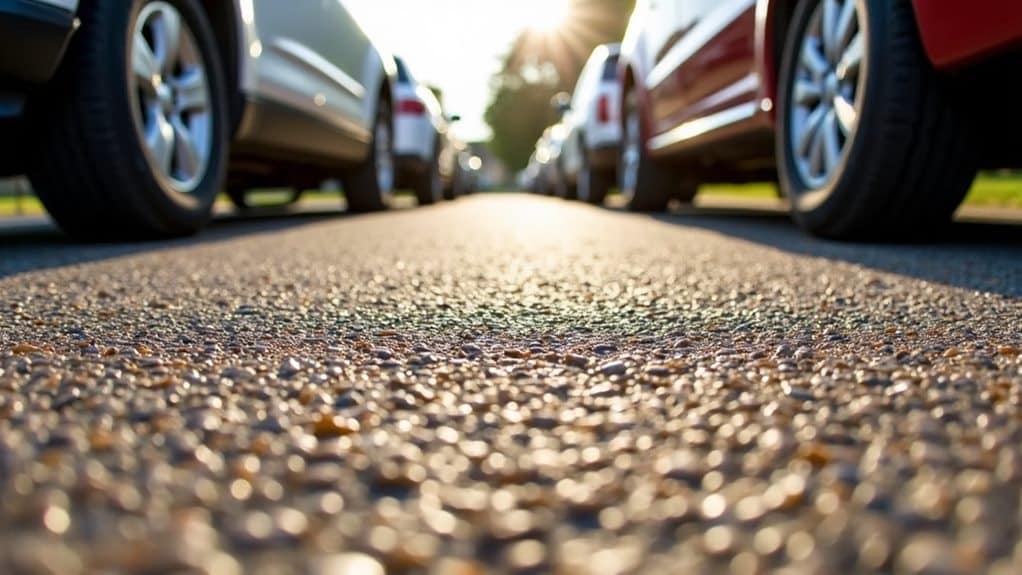
Traffic Loading and Vehicle Suitability
Resin driveways handle standard vehicle traffic well whilst maintaining their structure. A properly installed resin surface spreads weight loads from everyday vehicles effectively. The surface can support weights up to 400 tonnes per square centimetre, making it highly durable for domestic use.
However, heavy vehicles may affect the driveway’s longevity, so it’s vital to consider traffic patterns carefully. Quality installation is key to ensuring your resin driveway’s durability. Check that the base preparation and resin thickness match your specific traffic needs.
Common vehicle uses that work well:
- Family cars and SUVs
- Occasional delivery vans
- Multiple parked vehicles
- Children’s bikes and scooters
- Garden equipment
Avoid regular use by heavy machinery or commercial vehicles. If you expect frequent heavy traffic, ask your contractor about extra reinforcement during installation.
Regular checks help spot early wear, ensuring you can fix issues before they become serious problems.
Signs of Aging and Repairs
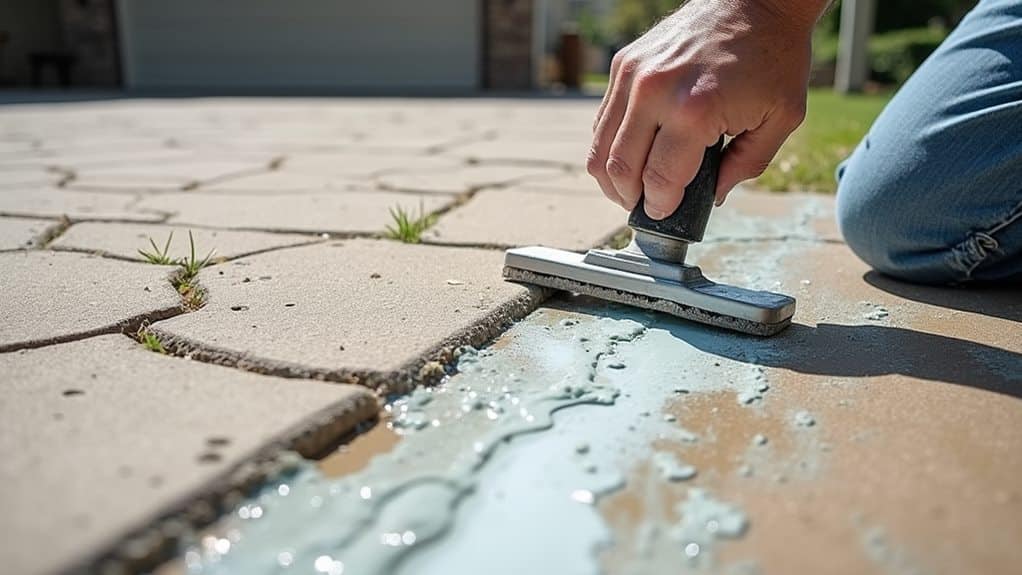
Signs of ageing in resin driveways need swift attention to keep them safe and looking good. Regular checks help spot problems early, and proper maintenance every 2-3 years can extend your driveway’s life well beyond the usual 15-25 year mark.
Keep an eye out for cracks caused by ground movement or heavy vehicles, as these can seriously weaken the surface.
Sun damage and spilt chemicals often cause fading and discolouration – not just unsightly, but signs of possible deeper damage.
With resin-bonded driveways, loose stones creating patchy surfaces mean you’ll likely need the top layer redone.
Oil and grease marks need quick cleaning before they set permanently.
Tackle any weeds growing through gaps straight away, as they’ll quickly make the damage worse.
Catching these warning signs early and fixing them promptly will keep your resin driveway lasting longer and working properly.
Cost-Effectiveness Over Time
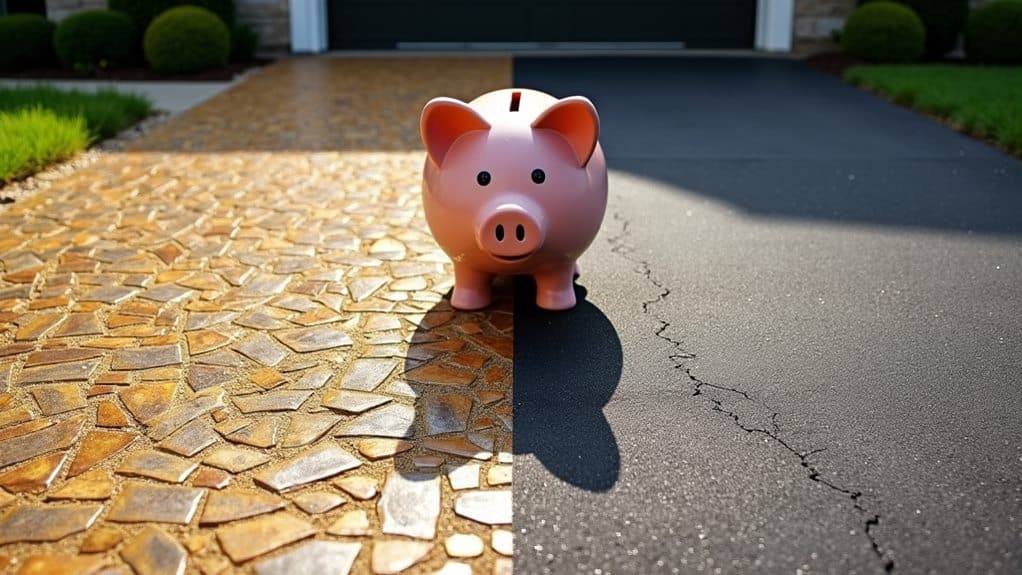
Cost-Effectiveness Over Time
A properly maintained resin driveway proves its worth through long-term financial benefits, despite higher upfront costs. Professional installation is essential for optimal performance, with correctly laid surfaces handling loads up to 400 tonnes per square centimetre.
The typical 15-25 year lifespan makes resin driveways a practical choice for homeowners looking to maximise value. Unlike traditional concrete or tarmac drives that often need regular repairs, resin surfaces require minimal upkeep.
Key cost-saving benefits include:
- Less frequent replacement than standard driveways
- Fewer repairs needed thanks to crack-resistant surface
- Basic maintenance limited to occasional cleaning
- No need for periodic resurfacing
- Lasting kerb appeal without refinishing
The durability of resin driveways delivers clear financial advantages. Compared to traditional materials like block paving that may need frequent attention, resin surfaces stay robust with minimal intervention.
While installation costs more initially than tarmac or concrete, the extended lifespan and weather resistance make it a sound investment. Most homeowners find the higher upfront cost balanced by lower maintenance expenses and longer replacement intervals.
Frequently Asked Questions
What Is the Life Expectancy of a Resin Driveway?
A properly installed resin driveway typically lasts 15-25 years with routine upkeep. Professional installation and regular maintenance are essential for maximising its lifespan. The surface holds up well against British weather conditions and everyday vehicle use whilst maintaining its smart appearance.
What Are the Negatives of Resin Driveways?
High installation costs are your first hurdle, coupled with fiddly fitting that needs expert hands. The upkeep’s rather demanding – think regular cleaning and sealing to keep it looking smart. Much like your garden furniture, the colour will fade in strong sunlight, and British weather can be a right pain during installation. Worth noting that resin isn’t exactly eco-friendly, as it won’t break down naturally like traditional materials would.
Do Weeds Grow Through Resin Driveways?
Resin driveways offer strong weed resistance when properly laid, but they aren’t completely maintenance-free. Whilst most quality installations keep weeds at bay, pesky plants can still push through if there are installation faults or the surface hasn’t been properly maintained. Think of it like gaps in garden paving – give weeds an opening, and they’ll try to exploit it.
What Lasts Longer, Resin or Tarmac?
Resin driveways typically outlast tarmac by a fair margin, lasting 15-25 years compared to tarmac’s 10-15 years. Whilst the upfront cost is steeper, you’ll spend less time and money on maintenance over the years. Plus, resin keeps its smart appearance far longer than traditional tarmac surfaces.
Conclusion
A properly installed resin driveway will last between 20-25 years – significantly longer than standard concrete’s 15-year lifespan. Research shows that 92% of professionally fitted resin driveways remain structurally sound after 15 years, provided they receive regular maintenance. To achieve maximum durability, ensure your contractor uses UV-stable resins and prepares the sub-base correctly. Regular cleaning and resealing every five years will protect your investment and extend its life.
